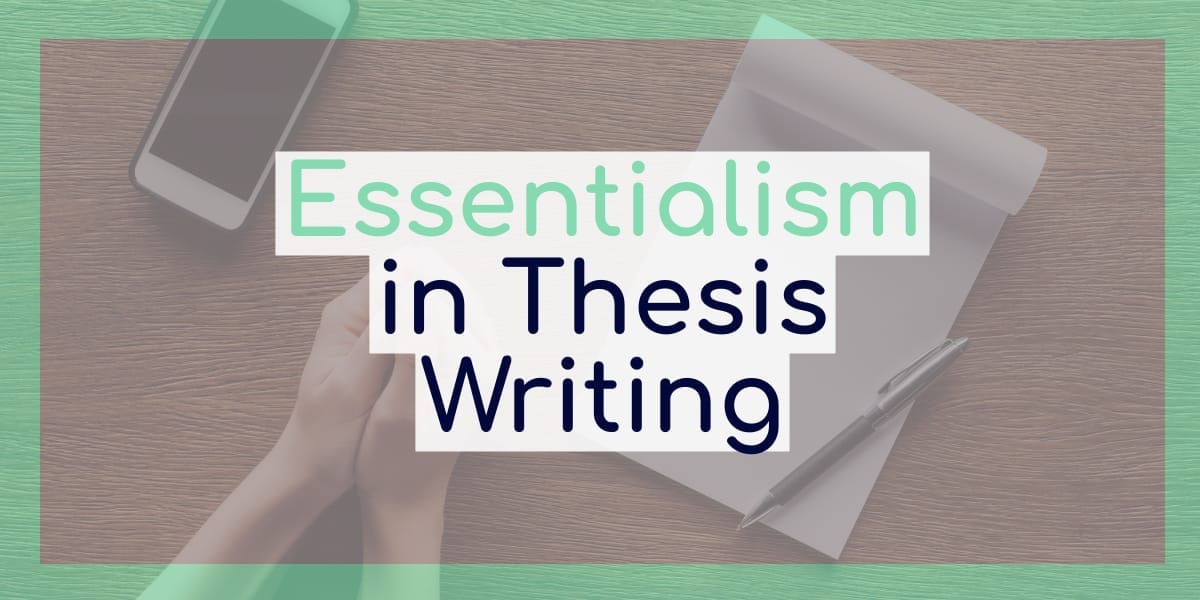In the realm of academic research and thesis writing, the journey often intertwines with complexity and an overload of information. This is where the principles of Essentialism, eloquently captured in the book “Essentialism: The Disciplined Pursuit of Less,” become particularly relevant. Essentialism isn’t about how to get more things done; it’s about how to get the right things done. For a researcher or thesis writer, this means laser-focusing on what truly adds value to their academic pursuit.
Explore: Identifying What’s Truly Essential
The exploration phase in thesis writing is about diving deep into a sea of ideas and literature, but with a clear objective. Essentialism here emphasizes the need for focused, uninterrupted time dedicated to research. This means enhancing observational skills to spot critical gaps in existing literature and allowing oneself the freedom to brainstorm and think outside the box. This phase is all about asking the right questions: What is at the heart of my research? What specific problem or gap am I aiming to address? By narrowing down these areas, researchers can channel their energies more effectively.
Eliminate: Cutting Out the Non-Essential
With a clear direction established, the next step is eliminating distractions and non-essential tasks. This could mean gracefully declining additional projects or collaborations that don’t align with the main objectives of your thesis. Essentialism in this stage also means critical editing of your thesis draft, removing sections that don’t contribute to your central argument, and focusing only on content that genuinely enhances your research. Setting boundaries around your time and commitments is crucial, as is prioritizing sleep and self-care to maintain a sharp and focused mind.
Execute: Efficiently Carrying Out Essential Tasks
The execution phase is where the rubber meets the road. This involves setting up time buffers to manage unexpected delays in experiments or data analysis, and removing obstacles that hinder smooth progress. Celebrating small victories and establishing productive routines can build momentum. Additionally, staying focused on the present and continually asking “What’s Important Now?” helps maintain concentration on immediate, essential tasks.
Practical Tools: Enhancing Execution
Visual note-taking, such as diagrams or flowcharts, can be invaluable for researchers. These tools help clarify thoughts, make better decisions, and execute essential tasks efficiently. They also act as visual aids in understanding and communicating complex ideas more effectively, a crucial aspect in the world of research.
Living as an Essentialist Researcher
Adopting Essentialism in thesis writing is a continual process. It involves constantly reevaluating priorities, pushing away distractions, and focusing on what adds the most value to your research. This approach enables researchers to navigate the often overwhelming journey of thesis writing with more clarity, purpose, and efficiency, leading to more meaningful and impactful research outcomes.
Quick Actionable Checklist for Essentialism in Thesis Writing
- Define Your Core Research Question: Identify the main problem or gap your thesis addresses.
- Set Focused Research Time: Dedicate uninterrupted time slots solely for deep work on your thesis.
- Learn to Say No: Politely decline tasks or projects that don’t align with your thesis goals.
- Edit Ruthlessly: Continually refine your thesis, removing non-essential content.
- Prioritize Self-Care: Ensure adequate sleep and breaks to maintain mental sharpness.
- Set Clear Boundaries: Protect your research time from other commitments.
- Use Visual Aids: Employ diagrams or flowcharts to simplify complex ideas.
- Celebrate Small Wins: Acknowledge and celebrate progress in your thesis journey.
- Stay Present: Focus on the task at hand, asking “What’s Important Now?”
- Review and Adjust Regularly: Regularly assess your approach and adjust your strategies to stay on track with your thesis goals.

